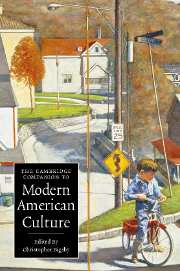Book contents
- Frontmatter
- 1 Introduction: What, then, is the American?
- 2 The American century
- 3 The regions and regionalism
- 4 Immigration to the United States in the twentieth century
- 5 Religion in the United States in the twentieth century: 1900-1960
- 6 Shifting boundaries: religion and the United States: 1960 to the present
- 7 The Hispanic background of the United States
- 8 African Americans since 1900
- 9 Asian Americans
- 10 Women in the twentieth century
- 11 Queer America
- 12 The United States, war, and the twentieth century
- 13 The culture of the Cold War
- 14 Secret America: the CIA and American culture
- 15 Vietnam and the 1960s
- 16 New York City and the struggle of the modern
- 17 Music: sound: technology
- 18 African American music of the twentieth century
- 19 Hollywood cinema
- 20 Popular culture
- 21 Theatre
- 22 Society and the novel in twentieth-century America
- 23 “Preferring the wrong way”: mapping the ethical diversity of US twentieth-century poetry
- Index
- Series List
14 - Secret America: the CIA and American culture
Published online by Cambridge University Press: 28 January 2007
- Frontmatter
- 1 Introduction: What, then, is the American?
- 2 The American century
- 3 The regions and regionalism
- 4 Immigration to the United States in the twentieth century
- 5 Religion in the United States in the twentieth century: 1900-1960
- 6 Shifting boundaries: religion and the United States: 1960 to the present
- 7 The Hispanic background of the United States
- 8 African Americans since 1900
- 9 Asian Americans
- 10 Women in the twentieth century
- 11 Queer America
- 12 The United States, war, and the twentieth century
- 13 The culture of the Cold War
- 14 Secret America: the CIA and American culture
- 15 Vietnam and the 1960s
- 16 New York City and the struggle of the modern
- 17 Music: sound: technology
- 18 African American music of the twentieth century
- 19 Hollywood cinema
- 20 Popular culture
- 21 Theatre
- 22 Society and the novel in twentieth-century America
- 23 “Preferring the wrong way”: mapping the ethical diversity of US twentieth-century poetry
- Index
- Series List
Summary
Spying and writing have always gone together. In Britain, where the modern intelligence agency was born, intellectuals moved smoothly back and forth between secret government service and the literary life, some, like the journalist Malcolm Muggeridge, even spending the morning at the typewriter before consulting with MI6 after lunch. Somerset Maugham, Compton Mackenzie, Graham Greene, Ian Fleming, John Le Carré all placed their powers of observation and divination at the disposal of the British secret state while mining their experience of intelligence work in their fiction. It was not just a case of satisfying the reading public's apparently insatiable appetite for the espionage novel. There seemed to be some basic connection between the roles of writer and spy: both were iconic, even heroic figures in modern culture, necessarily detached from ordinary society, yet gifted - cursed, perhaps - with unique insight into the darkest realms of human existence. “I, from very early, lived a secret life, an inward life,” Le Carréonce told an interviewer. “I seemed to go about in disguise.”
In this respect, the spies of the Central Intelligence Agency (CIA) were no different from their British counterparts. Indeed, the “man of letters” was, if anything, even more conspicuous a figure in the upper echelons of the American secret service than in MI6. During World War II, Norman Holmes Pearson, a noted Yale professor of literature and editor, alongside W. H. Auden, of the five-volume Viking Poets of the English Language, ran “X-2,” the London-based counterespionage branch of the Office of Strategic Services (OSS), the United States' wartime foreign intelligence agency.
- Type
- Chapter
- Information
- The Cambridge Companion to Modern American Culture , pp. 275 - 294Publisher: Cambridge University PressPrint publication year: 2006



